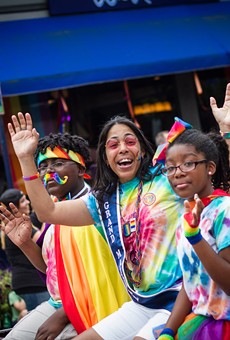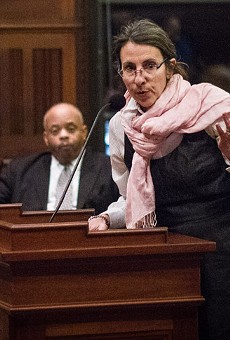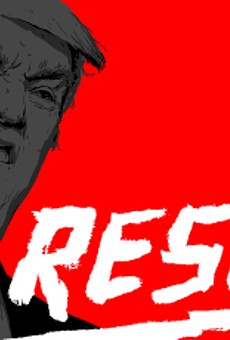A year ago next Sunday, around 2,000 people turned out for the People's Solidarity Rally in Rochester's Washington Square Park. Simultaneously, millions of people around the world — an estimated 500,000 in Washington, D.C., alone — participated in Women's March protests the day after Donald Trump's inauguration.
Organized and led by women, the national movement focused on women's rights and reproductive rights, but many protests grew to include a range of issues threatened by Trump and his administration: immigration, LGBTQ rights, civil rights, disability rights, health care, climate change, police accountability, anti-fascism.
Jenny Muhl, an organizer of the local People's Solidarity Rally, said the Rochester protest's name was intentional since there were concerns around so many issues. Speakers at the rally included representatives from Rochester NOW, the Islamic Center, B.L.A.C.K., the Gay Alliance (now the Out Alliance), Worker Justice Center, and politicians like Mayor Lovely Warren and Assemblymember Harry Bronson. The message: that a Trump presidency was dangerous on numerous fronts.
Local activists and organizations say it's been an intense, frightening year since Trump's inauguration. And a bombardment of news and actions has created real fatigue for many. But there is also optimism in the growth of the number of people becoming involved in social action.
"All of these movements preceding this have sort of congealed into one big voice," said Laurie Kash, a local filmmaker, writer, and advocate who often works with Enough is Enough. "That's what makes me feel good."
Kash went to Washington for the Women's March and made a short documentary focusing on ordinary people, particularly people of color, marching through the street. Trump's election, Kash said, was a shock, but it woke up many people and led to them speaking out against injustices on multiple fronts.
Rallies are the beginning, said Jenny Muhl, who also helped organize the People's Climate Movement rally last April. "It's a morale boost, and it's a way to get people involved," she said, "but a rally in and of itself — it's not changing policy. It's motivating people. It's their first step."
A Women's Rally, organized by Indivisible Rochester and SUNY Brockport's Gender Equality Movement, is planned for Saturday, January 20, beginning at 11 a.m., at Washington Square Park. (Information: facebook.com/IndivRocNY.) And a "Women March in Seneca Falls" will take place Saturday, 10 a.m., beginning at the Women's Rights National Historical Park in Seneca Falls. (Information: facebook.com/WomenMarchSenecaFalls.)
In interviews last week, advocates and organizers talked about the first year of Trump, how national actions have impacted Rochester communities, and what they expect in 2018.
Related Our anti-inaugural

NYCLU
Iman Abid, director of the New York Civil Liberties Union's Genesee Valley Chapter, let out a heavy sigh: The first year of Trump's presidency has been "an incredible whirlwind," she said.
"As soon as you try to understand something," she said, "whether it's an internal memo that's been released by the Department of Homeland Security or it's a new testimony the Attorney General has been giving — every day, something has been changing."
In 2017, the American Civil Liberties Union has sued the federal government over numerous issues, including Trump's Muslim ban, the directive banning transgender people from serving in the military, and the decision to end the Deferred Action for Childhood Arrivals program. But the pace of the Trump administration's actions, Abid said, has left a lot of confusion. The Muslim ban, for example, has made local refugee populations unsure about whether they can travel and whether their families can come into the country.
That confusion has also impacted local protestors, she said, and slowed momentum that built up post-election. Early on, the NYCLU chapter saw about 500 new people asking them how to help locally, Abid said, but "the level of energy hasn't been sustained over the course of the last year. I think it's because people are still new to what organizing means and what it takes — which is completely OK. People are starting to think back on what it is they need to focus specifically in on."
Rochester has long been a socially active city, Abid said, and she has noticed more coalitions being built as groups work together on common issues.
In the next year, Abid said, the NYCLU chapter will continue to keep watch and work to connect for people how various issues intersect — especially in policing. She also hopes to make sure the organization and those working with it have the energy needed to perform actions throughout the year.
Environment
The last year has seen an assault by the Trump administration on laws and regulations that protect the environment and reduce carbon emissions. Trump has issued order after order rolling back Obama-era climate policies, has announced plans to withdraw the US from the Paris climate accord, and appointed Scott Pruitt, who sued the Environmental Protection Agency 14 times while he was Oklahoma attorney general, to head the agency.
It has made local, regional, and state action all the more important, said Linda Isaacson Fedele, a member of the bipartisan Rochester People's Climate Coalition leadership team. And locally, there have been good things happening. Last May, the City of Rochester passed a climate action plan with a goal of reducing greenhouse gas emissions from 2010 levels by 40 percent by the year 2030. And in August, Mayor Lovely Warren signed the Sierra Club's "Mayors for 100 Percent Clean Energy" vision and announced her intention to pursue options for a Community Choice Aggregation program, which allows local governments to negotiate an energy supply contract — advocates push for renewable energy options — for residents and businesses.
Fedele said she has also seen more people get involved with climate and environmental issues in the last year, but she emphasizes that it will take everyone to enact change, pushing leaders to make climate action a priority. In 2018, the RPCC will work to develop relationships with more municipal and business decision makers, Fedele said, "so that we can see climate change action starting to happen on a scale that is commensurate with the magnitude of the climate crisis."
Immigration
Immigration has been a central part of Trump's platform since he announced his candidacy, and the last year has brought real frustration, depression, and fear in the undocumented immigrant community, said John Ghertner of the Greater Rochester Coalition for Immigration Justice.
The Obama administration deported more than 800,000 people a year in 2009 and 2010 — earning him criticism from immigration advocates. And while arrests and deportations under Trump are well below that, enforcement of new policy has been more draconian, Ghertner said. Fewer people are being released from the Buffalo Federal Detention Facility before their court dates, and more people are being charged with illegal reentry into the US, a federal crime.
Trump's decision to end the Deferred Action for Childhood Arrivals has had a harsh impact on the population Ghertner works with in Wayne County. "There's no leniency for anything," he said. "That has had the biggest impact: the lack of leniency, the draconian measures to deal with the population."
Local action has been taken to push back in the last year. Rochester updated its Sanctuary City status in March, and Ghertner said, there's been a resurgence of people actively engaged with defending immigrant communities.
"Unaffected community members are stepping up to the plate in a way I haven't seen in many years," he said. And the community of affected people has also become emboldened in a sense; immigrant students are protesting and appealing to politicians to act.
LGBTQ
"It has been a real challenging year for the LGBTQ community here in Rochester as well as around the country," said Out Alliance Executive Director Scott Fearing. "In Rochester we have a city that has shown strong support, especially for the trans community. But to have the national leadership suddenly say, 'We don't want you in the military; we're not going to protect you': that has been a real challenge."
"There's been an empowering of folks who are opposed to our communities," Fearing said. "Our communities are wrestling between being fearful and remaining strong to stand up to the challenges we've been facing."
City leadership has been important, he said, but the state needs to pass the Gender Expression Non-Discrimination Act, which adds protections for gender identity and expression to the state's hate-crimes laws. GENDA has been voted down at every legislative session since 2003.
In the two weeks following the election, roughly 250 people called the Out Alliance to volunteer, Fearing said, most of them straight allies. And more people have been using the alliance's services.
But given the chaos of the administration, fatigue and complacency are challenges. Fearing hopes that in the coming year people will be "vigilant and watchful of what's going on and thoughtful of where something that may seem unrelated could lead."





![[UPDATED] Photo gallery: Solidarity Rally draws 2,000 downtown](https://media2.roccitymag.com/rochester/imager/u/mobileteasertall/2954616/kmf_8874.jpg)
